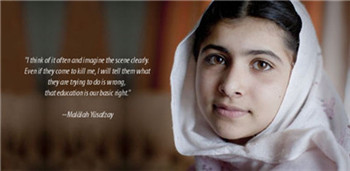(单词翻译:单击)

That morning had begun like any other, though a little later than usual. It was exam time so school started at nine instead of eight, which was good as I don’t like getting up and can sleep through the crows of the cocks and the prayer calls of the muezzin. First my father would try to rouse me. ‘Time to get up, Jani mun,’ he would say. This means ‘soulmate’ in Persian, and he always called me that at the start of the day. ‘A few more minutes, Aba, please,’ I’d beg, then burrow deeper under the quilt. Then my mother would come. ‘Pisho,’ she would call. This means ‘cat’ and is her name for me. At this point I’d realise the time and shout, ‘Bhabi, I’m late!’ In our culture, every man is your ‘brother’ and every woman your ‘sister’. That’s how we think of each other. When my father first brought his wife to school, all the teachers referred to her as ‘my brother’s wife’ or Bhabi. That’s how it stayed from then on. We all call her Bhabi now.
这天早晨,和往常没什么两样。不过,因为要考试,我们可以九点去上学,比平时晚一个小时。我很喜欢这样,因为可以不用早起,可以睡到比鸡鸣声更宜人的召唤声响起时再起床。父亲一开始会试着叫我起床。“该起床了,亲爱的Jani Mun!”“Jani Mun”在波斯语里是“灵魂伴侣”的意思,他每天早上都会这么叫我。“再过几分钟,爸爸,拜托。”我会这么央求他,然后往被窝里钻得更深些。然后,母亲就会过来,轻声叫我:“Pisho!”Pisho是“小猫咪”的意思,是她呼唤我的方式。这时候我才发现已经晚了,便大叫着“我的嫂嫂啊,我要迟到啦!”跳起来。在我们的文化里,每个男人都是你的“兄弟”,每个女人都是你的“姐妹”。这就是我们看待彼此的方式。所以,当父亲第一次把妻子带到学校去的时候,所有的老师都喊我母亲“我兄弟的妻子”,也就是“嫂嫂”。于是,母亲就有了这个称号。现在,大家都喊她“嫂嫂”。
I slept in the long room at the front of our house, and the only furniture was a bed and a cabinet which I had bought with some of the money I had been given as an award for campaigning for peace in our valley and the right for girls to go to school. On some shelves were all the gold-coloured plastic cups and trophies I had won for coming first in my class. Only twice had I not come top – both times when I was beaten by my class rival Malka e-Noor. I was determined it would not happen again.
我的房间是长方形的,位于我们家房屋的最前面。房间里很简陋,只有一张床和一个橱柜。这个橱柜是用我在为河谷地区争取和平和女性受教育权利时获得的部分奖金购买的。其中的几格架子上,放满了我在班上得到第一名时获得的金色塑料奖杯和奖牌。大多数时候,我都是第一名,仅有的两次失手是被班上的对手玛尔卡·努尔打败。但我已经下定决心,决不会让此事重演。
The school was not far from my home and I used to walk, but since the start of last year I had been going with other girls in a rickshaw and coming home by bus. It was a journey of just five minutes along the stinky stream, past the giant billboard for Dr Humayun’s Hair Transplant Institute where we joked that one of our bald male teachers must have gone when he suddenly started to sprout hair. I liked the bus because I didn’t get as sweaty as when I walked, and I could chat with my friends and gossip with Usman Ali, the driver, who we called Bhai Jan, or ‘Brother’. He made us all laugh with his crazy stories.
学校离我家不远,以前我都是走路上学。但自从去年开始,我就跟着其他女生一起搭人力车上学,再搭校车回家。这段路程只有五分钟的时间,我们要穿越恶臭的小溪,经过一个巨型广告牌,广告牌上是胡马雍医生植发中心的广告。当一位秃头男老师突然长出头发时,我们都说他肯定去过了那家植发中心。我喜欢搭校车,这样就不会因为走路而满身大汗,而且还可以和朋友们聊天,和司机乌斯曼·阿里侃八卦,我们都喊他“Bhai Jan”,就是“哥哥”的意思。女孩子们总是被他的疯狂故事逗得哈哈大笑。


